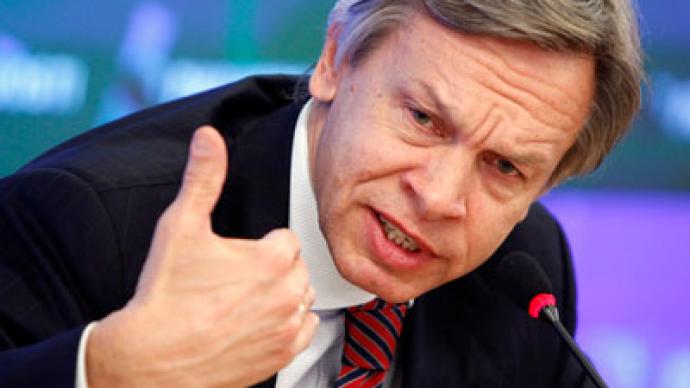Duma weighs response to Magnitsky Act, noting 'selective' US human rights policy

In response to the Magnitsky Act Russia will take similar, reciprocative actions, Foreign Minister Sergey Lavrov said. And according to the head of the Duma's International Affairs Committee, lawmakers have already discussed such options.
On the legislative front, Russia has two options through which to respond, Aleksey Pushkov told RT.Narrow response“The first is to introduce amendments to already existing legislature regarding entering and exiting the Russian Federation,” he said, adding that such amendments could be adopted fairly quickly because they have already been drafted by all factions of the parliament in June of last year.The amendments declare that any US citizens who, “according to our judgment are guilty of inflicting both moral or material damage to Russian citizens abroad – but first of all in the US – can be denied entry into the Russian Federation, and their accounts could be frozen in Russia,” Pushkov explained.An embargo could also be placed on any of their businesses or investments in Russia, he added. Harsh responseA much harsher response – and the Duma International Affairs Committee is leaning towards this one, Pushkov says – could be to introduce a new, separate law according to which all Americans suspected by Moscow of violating not only Russian citizens' rights abroad, but also “widely accepted universal human rights,” will be sanctioned by Russia.“For example, it could be former employees of Guantanamo who are now conducting their business and want to visit Russia for whatever reason,” Pushkov said. “In this case, such an individual will not be allowed entry.” “It could also be people who were involved in the deaths of innocent civilians during NATO operations in Iraq and Afghanistan,” Pushkov continued. “It could also involve those related to torture – secret tortures that were practiced all over Europe. It could also be evoked against individuals suspected of kidnapping abroad.”“It could be a quite large list of individuals who, according to Moscow, have violated universal human rights,” he concluded.A ban list of American citizens, who are currently being allowed entry to Russia, already exists. It includes a former director of Guantanamo who now works for a private business that is handling a project in Russia. His latest visa request was denied. Thus the entire US business establishment that has interests in Russia could fall subject to such scrutiny, Pushkov said.If such legislature is indeed adopted, it would be a groundbreaking milestone in the history of the Russian Federation. “Human rights are a universal value, and nobody is restricted to adopt their own national law based on this principle,” Pushkov said.‘Washington has mythologized itself as a human rights protector’The Duma's International Affairs Committee is considering the harsher option, as the overall feeling is that Russia should be involved in protecting the rights of the people, Pushkov said.“The thing is that Washington has created this myth of a protector of human rights,” he explained. “But if you examine what is being done by US representatives worldwide, then it is clear that it does not stand up to any criticism. They for example didn't utter a single word of sympathy about the civilians – the women and children – killed in the latest Gaza conflict. Nothing was said by American officials.”US foreign policy is characterized by a selective approach to human rights issues, using them as a device to promote American geopolitical interests, Pushkov told RT.“This type of injection of the human rights theme deserves a response from our side,” Pushkov sated. “Why should we be denied the right to condemn civilian killings in wars, about states that are being occupied illegally despite UN rules and regulations, and about drone strikes?”














